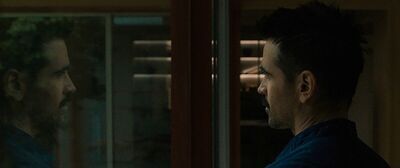
The world is dealing with grief right now on a massive scale. There’s the direct grief of the amount of death that people have faced in the last two years, but also a grieving of ways of life that have shifted, possibly forever, and the divisions that the pandemic clarified in society. With “After Yang,” Kogonada (“Columbus”) has made a film that taps into loss and grief in a way that feels both progressive and familiar at the same time. His adaptation of the short story “Saying Goodbye to Yang” by Alexander Weinstein takes place in a future with technology that doesn’t exist today, and yet it’s one of the most present science fiction films I’ve ever seen. So many visions of the future seem distant, but “After Yang” hits home in how it centers connection and experience to which we can all relate. It’s a powerful, moving drama about what it means to be alive.
In this future, something exists called a “techno sapien.” Imagine the logical development of tech like Alexa to an android form, a companion who can assist around the house, learn new habits, and even provide a tie for your adopted child to her culture. That was the hope of parents Jake (Colin Farrell) and Kyra (Jodie Turner-Smith) when they purchased Yang (Justin H. Min), more than just a babysitter to young Mika (Malea Emma Tjandrawidjaja). Yang became a part of the family. And then Yang broke.
Jake encourages the heartbroken Mika that he can find the person to repair the unresponsive Yang, but Jake bought him refurbished instead of new, so the warranty and even the original seller aren’t as easy to track down. It leads him to an underground parts dealer who basically removes a memory bank from Yang. The designers were testing a technology wherein the androids could record a few seconds at a time whatever they considered important. Jake watches some of these memories, many of which unfold as montages that reminded me of the memories from “The Tree of Life”—a beautiful moment with Mika, something gorgeous in mother nature, a sound bite, etc. The impact of these sequences is unforgettable if you really consider what’s happening. Imagine being able to look through the eyes and memories of someone you’ve lost. What did they consider important enough to record? What mattered to them? How did they see you and themselves? As Jake endeavors to save Yang, he discovers how much he didn’t know about him, including a relationship with a girl named Ada (Haley Lu Richardson), who has a startling story of her own.
There are also flashbacks to key moments in the life of Yang with the family. Kogonada plays with aspect ratio, using three to delineate perspectives. In one of the crucial Jake memories, Yang is asking his owner/father how he got into the business of selling tea. Jake tells him he doesn’t even like the flavor but the experience—the steeping, the smell, the process. Yang knows all the facts there are to know about the history of tea, but he can’t be programmed with what really interests Jake about it. And Kogonada expands on this tactile quality throughout the movie. It’s a sci-fi film movie that’s more interested in mother nature than technology. "After Yang" has a smell and a texture that’s rare in any genre, but especially science fiction. It reminded me of the work of Andrei Tarkovsky in this way.
Kogonada blends this refined craftsmanship with a deeply humane streak when it comes to performance. Farrell is one of our most underrated actors, able to do broad blockbuster acting like the upcoming “The Batman” and something so much more intimate like this project. He imbues Jake with just the right blend of grief, frustration, and uncertainty. He wants Yang back, not only for his daughter but for what he meant to Jake too. And when it appears that Yang’s memories could be a part of a public display, he questions what’s appropriate when it comes to how our loved ones are remembered on a broader scale. What do we keep for ourselves? What do we share with the world? Through all this technology and deep philosophy, Farrell grounds the film by understanding how much we will continue to look for those elusive aspects of life that can’t be created in a lab. It’s an incredibly subtle performance, one that’s matched by the whole cast, including supporting players like Sarita Choudhury and Clifton Collins Jr.
Much of “After Yang” feels like a dream. It’s in the way the images of Yang’s memories tumble into one another to the gorgeous music by ASKA and Ryuichi Sakamoto. It’s in this vision of a world that’s not our own but not too far removed, a common backdrop to dreamscapes. Kogonada's film is constantly asking incredibly deep questions, culminating in a flashback scene in which Kyra and Yang talk about what’s next. Yang hasn’t been programmed to believe in anything, even saying “There’s no something without nothing.” Is life the something, following by the nothing? However, he seems to be shifting even in this scene, using a quote that's been attributed to Lao Tzu: “What the caterpillar calls the end, the rest of the world calls a butterfly.” His visions of existence are shifting and growing, moving away from the precise details of his coding to the imprecision of humanity, steeping like a good tea. We all are.
This review was filed from the premiere at the Sundance Film Festival. The film will open theatrically in March 2022.
0 Commentaires